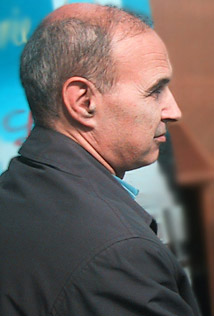We regret the passing, on April 11, 2024, of the distinguished Romanian author and critic Dan Cristea, who served as the editor in chief of the Luceafărul de Dimineață cultural monthly. In addition to being an alum of the 1985 Fall Residency, Cristea received his PhD in Comparative Literature at the University of Iowa.

MOHAMED MAGANI (novelist, essayist, fiction writer; Algeria- IWP 1985, and New Symposium 2007) is the author of the novels La faille du ciel, which won the Grand Prix Littéraire International de la Ville d’Alger, Esthétique de boucher, Un temps berlinois, Le refuge des ruines, Une guerre se meurt and the short story collections An Icelandic Dream and Please Pardon Our Appearance. Among his essays are Histoire et sociologie chez Ibn Khaldoun and Enseignement primaire, où en sommes-nous? His most recent novel is Scène de pêche en Algérie [Fishing scene in Algeria] and his forthcoming novel, Le bruit d'une goutte d'eau, will be due out soon. His works have been translated into German, Italian, English, Serbo Croatian and Dutch. From 1995 - 2000 he was a writer-in-exile in Berlin, at the invitation of the International Parliament of Writers and the city of Berlin. He founded the Algerian PEN Club and is a Board member of International PEN. He lives in Essaouira.
You can read his “Writing in the Mirror of a River” on 91st Meridian, and his recent essay “Justice: a Shared Irresponsability” on the IWP website.
IWP: What are you working on right now?
MM: I have just finished a month of "séjour" in a "writer’s residency" in Anvers, Belgium, and I am returning to Essaouira the day after tomorrow. For three weeks I have been reading history books- not so much to ‘recharge my writerly batteries,’ but because I find that history is sometimes more powerful than the writer's imagination: I am writing now a historical piece as part of an academic work. The piece centers around piracy, privateering and renegades in the XVI-XVIIth century. Frankly, in this particular case history exhausts fiction. This is the reason why I am not at ease with the historical novel; I am even suspicious of this genre. Right away after the academic, historical piece, comes the turn of the narrative rails of fiction I feel I have to follow--a new novel.
IWP: What personal characteristic do you care most about in your life as a writer?
MM: The ideal characteristics for me is to live as a writer. The reason why I am in Belgium is that I have lost a place where to write. My grown up son has taken over my small library-work room and "thrown me out", saying, "Three walls belong to me, one to you."
IWP: No matter what IWP organizes, writers seem to take away impressions of Iowa City that defy prediction. After all this time, is there something about your stay in the US that you’ve been unable to forget?
MM: One of the turning point in my life is the fact that I tried my hand at writing fiction in English in Iowa City for the first time. Had I remained in the States I would have surely carried on in that language, though as a second or third one. I also miss the long walks between the city centre and the Mayflower, in at least two extreme seasons. With all the people I came to know and like.
IWP: Is there music that complements your writing?
MM: I believe I have lived in the most creative period in terms of music, the 60's and the 70's. And then blues, rock, and folk music from Algeria and elsewhere help me in my writing.
IWP: What are the reverberations of the digital and web-based literary activities in your region/language/literary circuits?
MM: I feel outside this world of digital everything. The world of books, journals, periodicals is still my favorite one.
IWP:What writers, or work, out there are in need of more translation and attention? What literary neighborhood excites you art the present moment?
MM: I think that not much attention is given to Arabic literature, and North African writing , with its linguistic variety in particular. Translation ought to be at the center of globalization.
IWP:From your vantage point, should the state be involved in supporting literary creativity, and if so, in what ways?
MM: There is much that the State should do to help writers and literature. Translation is badly in need of state subsidies. Meetings of writers worldwide. Book policies ought to be conceived to ensure larger readerships.
IWP:What—if anything-- has given you a cause for political optimism in the last decade?
MM: Not a single war has been won. There is some hope in people and states realizing that violence and the cult of hatred do not pay off.
IWP’s questions asked by Nataša Ďurovičová
Find Us Online